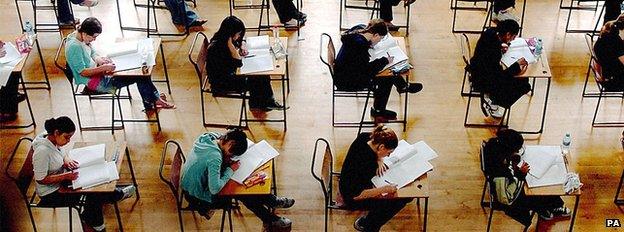The UK's diverging school systems
- Published

Education Secretary Michael Gove has said it is time to recognise the "natural and legitimate consequence of devolution" by having separate exam systems in each part of the UK.
GCSEs and A-levels have been central to the education systems in England, Wales and Northern Ireland for many years, and though Scotland already has its own separate system, significant new reforms are in the pipeline.
So how different has state-sponsored schooling in the UK's constituent parts become?
England
A number of fundamental changes to schools policy, conceived in Westminster and applying to England alone, have not been replicated elsewhere in the UK.
A push to bring in greater freedom for schools from local authority control began under the previous Labour government with academy schools, and continues under the coalition with the expansion of the academies programme and the introduction of free schools.
By 2015, it will be compulsory to remain in education or training until 18 in England; elsewhere the leaving age will remain at 16.
Changes to A-levels and GCSEs in England, such as scrapping modular courses, are not being followed by the devolved education systems in Wales and Northern Ireland.
While baccalaureates have sprung up in Wales and Scotland too, in England the word means something different. The English Baccalaureate is a league table measure which ranks English schools by the proportion of pupils who achieve good GCSEs (A* to C) in a core of subjects the government believes to be crucial to a good education - maths, English, two sciences, a foreign language and history or geography.
The Westminster government has also announced its intention to bring in a "technical baccalaureate" for England, showing young people's abilities in maths, literacy and vocational skills.
National curriculum tests, commonly known as Sats, are taken by all pupils at age 11, and the results of these are used to inform league table rankings. Similar tests for 14-year-olds were abandoned in 2008. Children aged seven are tested, but this is more low-key and the results do not count towards school league tables.
Wales
Learning through play, which proponents hope will boost pupils' creativity and imagination, is now central to the schooling of all three- to seven-year-olds educated in Welsh state schools.
Pupils aged seven to 14 in Wales face regular reading and literacy tests, but Sats were abolished in Wales in 2004.
The Welsh baccalaureate, meanwhile, is a fully fledged qualification, valued at the equivalent of an A grade at A-level. It brings together traditional qualifications like GCSEs and A-levels with the Bacc "core," comprised of a range of modules encompassing team activities and community participation.
League tables were ditched after devolution but last year, the Welsh government started to put secondary schools into five bands based on factors such as GCSE performance.
Scotland
Scotland's school system differed from the rest of the UK for decades before devolution reconvened the Scottish parliament in 1999.
Now the Scottish government is bringing in an entirely new curriculum. The "Curriculum for Excellence" aims to provide pupils aged three to 18 with a wider, more flexible range of subjects, and more skills designed to help them build careers later in life, such as team working.
In Scotland, there is no mandatory testing of pupils' literacy and numeracy; this is assessed instead with an annual survey of a sample of children aged between seven and 14.
Secondary pupils generally take Standard Grades, Highers and Advanced Highers rather than GCSEs and A-levels - although this is changing: National 4 and 5 courses are to replace Standard Grades.
The Scottish baccalaureate, like the Welsh one but unlike England's, is a qualification in itself, and has been available since 2009. To qualify, 16- to 18-year-olds take a mixture of Advanced Highers and Highers from an approved list of science, language, social science, or expressive arts subjects, as well as undertaking an "interdisciplinary project".
League tables in Scotland were abolished in 2003.
Northern Ireland
Pupils aged 10 in Northern Ireland's schools have, in previous years, been expected to take literacy and numeracy tests, but in 2013 this will be made voluntary after problems emerged with the computer system administering the tests.
The Northern Ireland Executive is reviewing whether any similar mandatory tests will be re-introduced at a later date.
Secondary schooling in Northern Ireland resembles that of England prior to much recent reforming, although NI ministers have launched a separate review into how well GCSEs and A-levels are fulfilling their purpose.
- Published21 May 2013
- Published7 February 2013
- Published18 September 2012